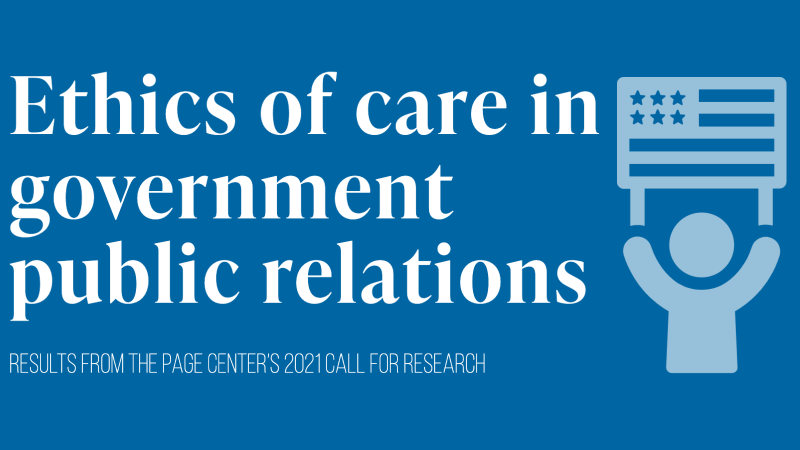Toward a caring government: PR practitioners’ approaches to ethics of care in the public sector
May 1, 2023

By Chuqing Dong, Michigan State University and Jordan Morehouse, Clemson University
While government public relations practitioners are constantly challenged by poor public trust, we have limited knowledge about how to foster organization-public relationships (OPR) in the public sector. Building and sustaining quality relationships with diverse publics presents distinct difficulties for government entities as compared to their corporate and nonprofit counterparts.
Governments, for example, do not get to choose “strategic publics,” but must serve all publics with different and even competing interests. Given the history of abusive use of power against marginalized populations, governments may not have a solid relationship basis with certain publics.
Given the complexities of government-public relationship (GPR) dynamics, we argue that the ethical and strategic government public relations practices should embrace a Care-Based Relationship Cultivation Model.
Unlike ethical orientations emphasizing rules and virtues, the ethics of care represents a feminist perspective of ethics that values mutuality, interconnectedness, empathy, and human flourishing in making situational moral decision-making.
When it comes to government public relations, we are particularly interested in two questions:
1. What does care mean to government communicators?
2. How do government communicators incorporate care ethics when cultivating relationships with publics?
To answer these two questions, we conducted interviews with 32 government communication practitioners within 27 counties in the United States during the summer of 2021. Participants include communication practitioners currently employed at county government organizations whose jobs involve public relations and associated tasks, such as public information, media relations, internal communication, community engagement, and community relations.
With the support from the Page Center, our findings were recently published in the article “Toward a caring government: Advancing ethical government public relations with a care-based relationship cultivation model” in the Journal of Public Relations Research. In this blog, we would like to highlight a few interesting and important findings.
First, our findings show that government communicators have diverse understandings of what care means to government public relations, yielding five key facets of care, including:
1. Proactively reaching out with a personal touch
2. Being an empathetic communicator
3. Embodying a personal dedication to the role of carer
4. Recognizing and protecting publics’ diversity and vulnerabilities
5. Acknowledging limitations of government communication
Second, government communication employees utilize specific care-based relationship cultivation strategies that are distinct when compared to their non-government non-profit and for-profit counterparts. These care-based strategies include:
► Access
► Openness
► Empathy
► Listening
► Flexibility
► Prioritizing decision quality competency of publics
► Humanization
For example, government communication employees maintain relationships with publics by practicing empathy, which is defined as the degree to which organizations are compassionate toward their publics and strive to actively remember and understand the struggles publics are facing when planning, implementing and evaluating communication campaigns, and when engaging with publics.
They practice empathy by remaining open-minded toward hearing the positive and negative opinions and experiences of publics in their daily lives, striving to understand publics’ perspectives, and remaining compassionate toward publics when publics are angry, confused, frightened, unknowing, unclear, and/or unchanging.
Another care-based strategy that emerged is prioritizing decision quality competency. In order to maintain positive relationships with their publics, government communicators strive to ensure that publics have the necessary information to make quality decisions regarding their property, finances, health, safety, education, and more.
The end goal of government communicators is not simply to supply accurate, timely, and relevant information to residents and the media. Instead, government communicators aim to ensure publics have all the information and resources necessary to make quality decisions for themselves and their families. This emerged through conversations regarding feelings of responsibility and duty, indicating a deeper level of care that decentralizes the organization and places constituents at the center of the communication activity.
The final care-based relationship cultivation strategy this blog post will discuss is humanization. Humanization refers to the practice of recognizing the humanity and shared attributes of an individual, or among individuals. This strategy is important to discuss because it reflects the unique and sometimes passionate nature of government communication. The humanization strategy has two components: communicators humanize the public and communicators humanize themselves.
Humanization is utilized by government communicators to remember each entity’s perspective and vulnerabilities, and that they are a person with a name who is either trying to help (communicator) or trying to receive help (citizen).
For example, our data reveal that government offices overall are short-staffed, overwhelmed, and often expected by citizens and media to be responsive 24 hours a day, seven days a week. When paired with anger or frustration over policies, procedures, or decisions made by officials, government communicators feel their humanness is frequently disregarded or forgotten. Thus, to maintain a relationship with their employer and protect themselves from occasional vitriol, participants employ protective measures to remember their own humanity and feelings.
The state of government communication and relationship cultivation practices needs immediate attention, and government communicators need support.
Managers in government organizations may use our findings to understand how communicators rationalize and internalize the concept of care and provide the necessary support to create a safe and supportive institutional environment in which frontline employees can fully realize their potential as caregivers and acknowledge their needs for self-care.
Our new Care-Based Relationship Cultivation Model and the suggested measurements provide a useful instrument for assessing government practitioners’ readiness and performance in incorporating care ethics into their everyday communication activities. Additionally, public relations educators may incorporate our findings into curriculum development to reflect the needs and concerns of ethical and compassionate conduct in government public relations.
For further information on this study, please email Dr. Chuqing Dong at cdong@msu.edu or Dr. Jordan Morehouse at jlmoreh@clemson.edu. This project is supported by the 2021 Page/Johnson Legacy Scholar Grant from the Arthur W. Page Center. Results from the study, including the Care-Based Relationship Cultivation Model, and suggested care-based relationship measures, are available here.

